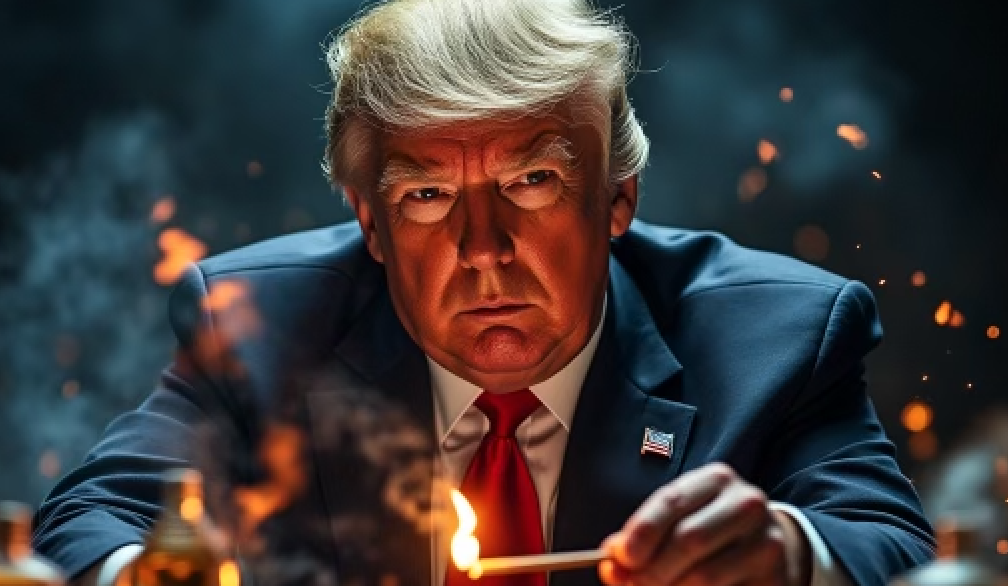America on the Brink: The Implications of a 2024 Trump Victory

In his first term as president, Donald Trump regularly displayed authoritarian impulses. Behind closed doors, he expressed a desire for violent retribution, reportedly discussing the execution of criminals through firing squads and gallows. These brutal fantasies were part of Trump’s broader vision of control, shaped by his infamous call to end “American carnage.” According to a report by Rolling Stone, these violent scenarios didn’t come to fruition due to checks by his advisers, but with the 2024 election approaching, the threat of an unchecked Trump looms large.
The Authoritarian Shift
Trump’s authoritarian tendencies were evident from the start. From the controversial Muslim travel ban to his efforts surrounding the January 6th coup attempt, he pushed the boundaries of his presidential powers. According to experts, Trump’s actions echoed those of infamous dictators, such as Rodrigo Duterte, who similarly embraced violent rhetoric as a means of governance. With key advisers gone and the Republican Party aligning more closely with Trump’s agenda, the risk of authoritarianism in a second term is greater than ever.
As Bernie Sanders has noted, the 2024 election may decide whether the U.S. continues to function as a democracy. Without the moderating influence of advisers who opposed Trump’s more extreme proposals, a second term could enable Trump to impose authoritarian policies with fewer obstacles.
The Agenda for 2024
Trump’s plans for a second term are far from ordinary. His proposed policies include dismantling the regulatory state, consolidating executive power, and dramatically increasing deportations. He has already promised to enact “the largest deportation operation” in U.S. history, echoing the brutal tactics used in Operation Wetback during the Eisenhower administration.
The expansion of presidential powers under Trump would be bolstered by a Supreme Court now more conservative than ever, thanks in part to Trump’s appointments. Legal scholars worry that with this alignment of forces, there will be few constraints on his actions. Trump’s desire for mass deportations, combined with his disdain for established legal processes, poses serious concerns for civil liberties and human rights.
A Campaign of Revenge
Central to Trump’s reelection bid is his desire for retribution. His infamous declaration at a 2023 rally in Waco, Texas, that he is the “warrior” and “retribution” for his followers, highlights his vengeful approach. The location was no accident—Waco is a symbol of anti-government extremism, and Trump’s message of revenge resonates with his most radical supporters.
Beyond rhetoric, Trump has threatened to use the Department of Justice to target political rivals, including President Joe Biden and his family. His repeated calls for investigations and prosecutions signal that a second Trump term would be defined by attempts to punish those he believes wronged him. This abuse of power would erode the foundations of American democracy and further polarize the nation.
Control Over the Military and Government
Trump’s influence over the military is another critical issue. In 2020, Trump clashed with his defense officials over the use of the military to suppress protests, a precursor to what may come in a second term. He has already expressed a willingness to deploy the National Guard against civilians and has suggested that federal agents could take similar actions.
Moreover, Trump has made it clear that he intends to gut the federal bureaucracy, replacing nonpartisan experts with loyalists. His ally J.D. Vance has proposed a “de-wokeification” program to purge the government of employees who are not aligned with their ideology. This reshaping of the federal workforce would effectively give Trump control over the country’s administrative machinery, further solidifying his hold on power.
2024: A Pivotal Moment
The stakes of the 2024 election are extraordinarily high. On one side, the Democratic ticket of Kamala Harris and Tim Walz represents the continuation of American democratic traditions. On the other, Trump and his running mate, J.D. Vance, represent a departure toward authoritarianism. Trump’s disregard for democratic norms and his focus on consolidating power makes this election a pivotal moment in U.S. history.
As Jason Stanley, author of How Fascism Works, warns, “Trump’s ambitions are clear, and they’re not going to be restrained by the people who stopped him before.” The potential consequences of a second Trump term go beyond ordinary political considerations—they could reshape the nation’s very identity.

